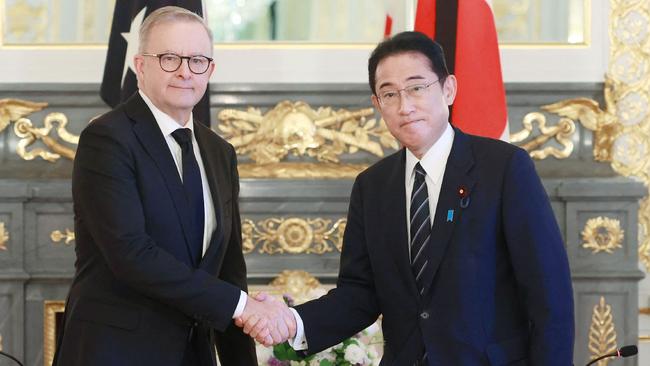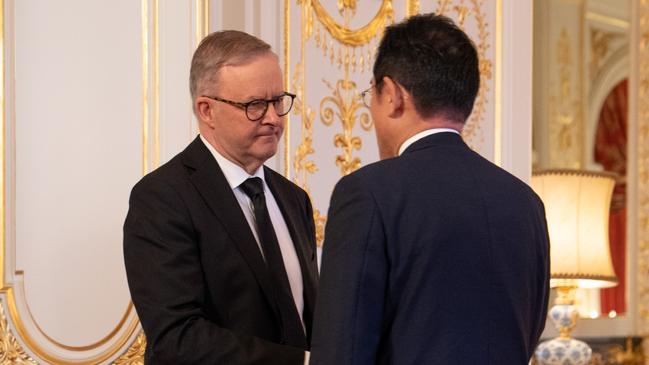Australia, Japan to boost military ties in Joint Declaration on Security Co-operation
Japanese Prime Minister Fumio Kishida will sign a bolstered defence agreement in response to a more aggressive China when he meets Anthony Albanese in Perth.

Australia and Japan will announce an “epoch making” agreement to strengthen intelligence sharing and enhance the interoperability of military capabilities in response to a more aggressive Beijing and an increasingly dangerous strategic outlook in the Asia Pacific.
Japanese Prime Minister Fumio Kishida will sign the new agreement when he meets Anthony Albanese in Perth on Saturday, officially updating the Joint Declaration on Security Co-operation finalised in 2007 between then prime ministers John Howard and Shinzo Abe.
Japanese ambassador to Australia Shingo Yamagami told The Australian on Wednesday the upgrade was “epoch making” and would help shape relations between the two nations for the next decade, with negotiations on the new agreement having taken place over the past two years.
“Of course there have been tremendous changes in our security environment facing our two countries (since 2007), not to mention China’s rapid military build-up and their repeated attempts to change the status quo by force,” Mr Yamagami said. “So we have to come up with an updated version of this joint declaration.”
“And this is going to be epoch making … In other words, this declaration will outline the direction of Australia/Japan defence co-operation for the next 10 years.

“We are at the last minute negotiating the wording of this document. But I will give you a heads up: measures to be taken together could include strengthening of the exchange of strategic assessments, including intelligence co-operation and deepening of consultations, and enhancing the interoperability of the ADF (Australian Defence Force) and Japanese SDF (Self-Defence Forces).”
Mr Yamagami said the updated agreement would be the centrepiece of Mr Kishida’s visit and send a “very clear, strong signal to the regional and international community.”
“The primary purpose is to increase deterrence in light of the challenging security environment … We have to respond to a deteriorating security environment, not only in the South China Sea (and) East China Sea, but the entire Pacific region.”
Mr Yamagami said the visit would reaffirm the leadership roles of Japan and Australia in promoting a “free and open Indo Pacific” and argued that both nations were seen as the closest and most trusted allies of the United States.
Outlining the need for the upgraded security declaration, Mr Yamagami said that Beijing’s official defence budget had quadrupled since 2007 along with the harassment of Japanese airspace by Chinese military planes.
“Whenever Chinese military planes approach our sky, we have to make scramble flights against approaching Chinese aircraft. The number of scrambles in 2006 was only 22.
“But in 2021 the number shot up to 722.”
He also warned that North Korea had launched missiles on 27 occasions in 2022 so far, including the firing of an intermediate range ballistic missile over Japan in early October.
“This is the kind of situation we are facing in 2022. We cannot address those challenges in the mindset of 2007,” Mr Yamagami said.
Mr Yamagami said Japan would like to see China become a “responsible member of the international community, abiding by rules and norms”.
“Whatever political system is chosen by any given country, what’s important is that the international community continues to abide by rules and norms.
“And in that regard I have a great sense of concern because we have seen a number of unilateral attempts by them (China) to change the status quo by force, intimidation, including economic coercion against Australia and Japan, including their measures to challenge the existing order in the East China Sea and South China Sea.”
The meeting between Mr Kishida and Mr Albanese in Perth will be their third since Mr Albanese won the May election, with the Prime Minister travelling to Tokyo days after his victory to attend the Quad leaders’ summit and then again in September to attend the state funeral for Mr Abe who was assassinated earlier this year.
“This is extraordinary between any countries,” Mr Yamagami said. “And this demonstrates how far we have come, the depth and closeness of the relationship.”
Mr Kishida will make the trip during a session of the Diet, the Japanese national legislature, with Mr Yamagami arguing it would “cement mateship between our two leaders.”
The secondary theme of the meeting will be the evolution of the economic partnership between Japan and Australia, including the growing importance of energy security for Tokyo.
“The ongoing situation in Ukraine heightened the sense of crisis in terms of securing energy supply. And in this regard there is a lot Australia and Japan can do together,” Mr Yamagami said.
“Australia can demonstrate it will remain a trusted, reliable supplier of energy to Japan … And Japan can show it continues to be willing to invest and trade with Australia. This is all the more important in light of the recent discussion about gas supply and coal royalty rates.”
Mr Yamagami said Japan could help Australia with its energy transition, noting there were already more than 30 hydrogen projects in Australia that relied on co-operation with Japan.
“We are also looking at the future too with decarbonisation. Here we can join forces,” he said. “A good example is making resilient supply chains for critical minerals. In the past, we’ve worked together on rare earth minerals when Japan faced economic coercion by China … Japan depended on Australia.”






To join the conversation, please log in. Don't have an account? Register
Join the conversation, you are commenting as Logout